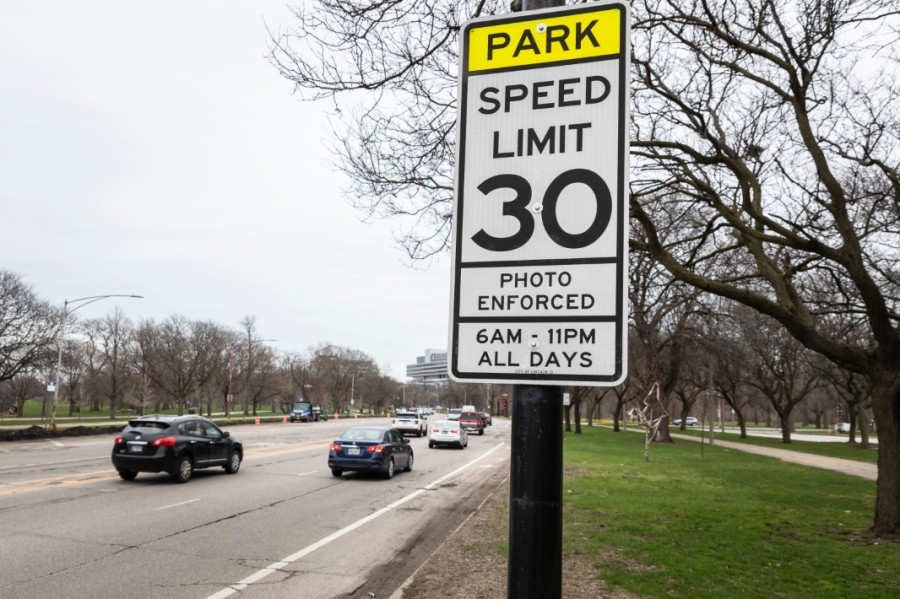Chicago speeders could still get $35 tickets after a City Council vote
In their last meeting before a summer break, Chicago aldermen rejected an effort to loosen the city’s speed camera program, and much more.
By Mariah Woelfel

Chicago speeders could still get $35 tickets after a City Council vote
In their last meeting before a summer break, Chicago aldermen rejected an effort to loosen the city’s speed camera program, and much more.
By Mariah WoelfelChicago aldermen have officially rejected a belabored effort to repeal Mayor Lori Lightfoot’s controversial policy that subjects Chicagoans to $35 speed camera tickets for driving 6 to 9 miles per hour over the limit in certain areas.
The vote by the full City Council on Wednesday means Chicagoans will continue to be subject to automated speed camera tickets for going 6 miles per hour over the limit, as opposed to 10 miles per hour some aldermen were pushing for.
Lightfoot introduced the $35 tickets as part of her 2021 budget and has argued it’s made streets safer since.
A proponent of the lower threshold, Ald. Daniel La Spata, 1st Ward, read numerous names of people he said have died in traffic fatalities in Chicago this year.
“I can’t stand here in good conscience and cast a vote that I know leads to more names on that list, more people losing their lives,” La Spata said.
Drivers who speed 10 or more miles per hour above the limit are subject to a $100 ticket if caught on camera. Speed cameras in the city are only allowed near parks and schools and there are 162 speed cameras throughout the city, according to city officials.
Council passes second significant ethics reform in three years
Chicago aldermen did approve a sweeping ethics reform amendment aimed at stamping out notorious corruption at City Hall. It’s the second significant ethics amendment passed during Lightfoot’s tenure and was championed by Ald. Michele Smith, 43rd Ward, who chairs the council’s ethics committee.
The amendment includes provisions to strengthen the city’s rules against nepotism, lobbying of City Council members and it limits campaign contributions for certain contractors. It also increases fines for violating those rules from a maximum of $5,000 to $20,000.
Currently, the city’s law prohibits employees and officials only from managing contracts with firms that employ or contract with their spouses or family members. But the new amendment would prohibit them from working on any “administrative, legislative action or decision” that affects their family, according to Steve Berlin, the executive director of the Board of Ethics.
New transit development policy aimed at luring jobs and housing to low-income areas
Aldermen also voted 36-10 to approve a years-in-the-making policy from Lightfoot’s housing department that creates incentives for development near train and bus stations on the South and West sides.
The overall policy is known as Transit-Oriented Development, or TOD, which places requirements on developments near CTA stops in an effort to make neighborhoods more vibrant, increase density and reduce parking spots.
City officials and transit advocates have been working for years to use a racial equity lens to give incentives to develop land near transit.
It aims at preventing aldermen from holding up affordable housing projects near transit stations and also expands TOD to more highly-used bus lines, not just L stops, among other things.
Aldermen give new tool to police to crack down on drag racing
The City Council also passed a measure that would allow Chicago police to seize vehicles used in drag racing or drifting whether or not the owner of the vehicle is present, in an attempt to crack down on recent highly-publicized incidents in and around downtown.
This past weekend, a West Loop intersection was shut down as a crowd of spectators watched cars spin tight circles for nearly an hour, the Sun-Times reports.
The ordinance allows police to impound vehicles that they have probable cause were involved in violating the city’s laws against drag racing or drifting. It does not require owners of the vehicle to be present when the police make the seizure.
An owner can contest the impoundment in an administrative hearing.
Water shutoffs banned
An ordinance that bans the city of Chicago from shutting off a resident’s water because they can’t pay their water bill also passed the City Council.
The amendment strikes a provision of the city’s water ordinance that allows the water department to cut off water connection “until all accrued refuse collection fees and penalties in arrears ha[ve] been paid.”
The ordinance also prevents the city’s water distribution system from being privatized in the future.
Some advocates pushed for an alternative proposal they say would more strongly protect low-income Chicagoans who can’t pay their water bills.
Mariah Woelfel covers Chicago city government at WBEZ. You can follow her at @MariahWoelfel.
